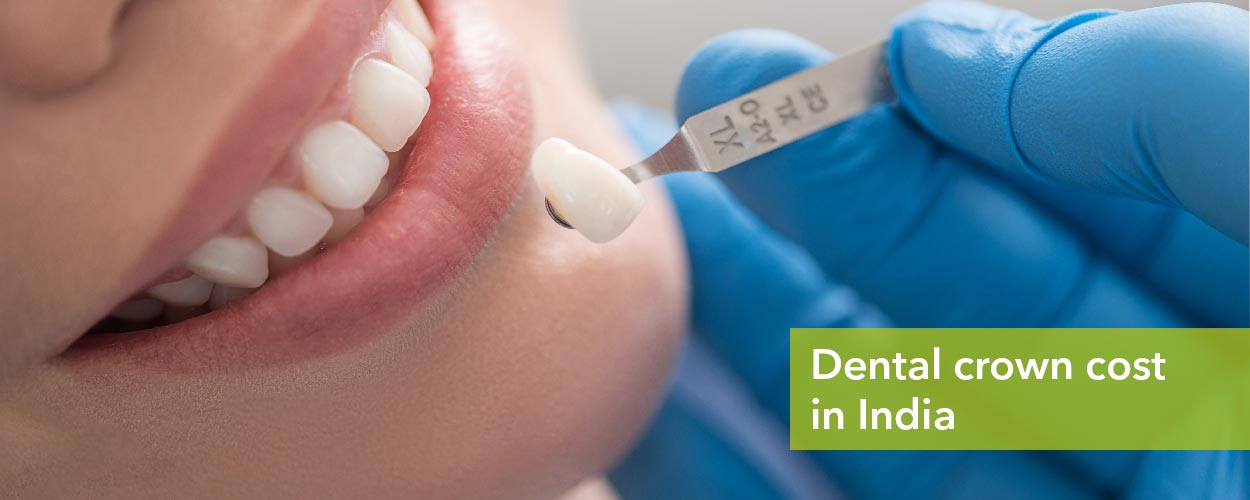Types of Dental crown
The different types of materials that are used in crowns are:
- Porcelain
- Metal
- Ceramic
- Zirconia
- Composite resin
- A combination of different materials
Metal or Gold crowns
These are crowns made of metal, generally gold alloys with a combination with copper and, nickel or chromium, and other metals. The metal crowns have the benefit of strength and durability. They might be a preferred choice for back restorations for many patients, depending on their particular needs. However, gold crowns have become a less popular choice these days due to their color and aesthetics.
Advantages of gold crowns:
- Strong and highly resistant
- Last a long time, if properly cared for
- Less wear and tear or quite slowly, just like the natural enamel (outer layer/covering of a tooth)
- Ideal for posterior/ back restorations (teeth in the back of the mouth), particularly second molars
- Requires removal of less part of the natural tooth
Disadvantages of gold crowns:
- The look isn’t great as they obviously don’t look like natural teeth
- Gold alloy crowns may side effects on some people, such as allergic reactions or swelling
Porcelain Crowns
These are the most popular type of crowns that are being used nowadays. Crowns made entirely of porcelain material, also known as all-porcelain crowns or all-ceramic crowns, and have many advantages as well as disadvantages.
Advantages porcelain crowns :
- All-porcelain or ceramic crowns gives the most natural look. They match the other normal teeth in shape, size, and color.
- This is an ideal option for the restoration of front teeth
- These types of crowns are biocompatible, which means no metal is involved and is toxic-free.
Disadvantages of porcelain crowns:
- Ceramic is not as strong as metal crowns. All-porcelain crowns may last a long time, but they require proper aftercare.
- It is usually recommended that patients who suffer from bruxism must opt for gold or Porcelain Fused Metal crowns
- The cost of these crowns might be higher than other types of crowns, particularly metal crowns. The ceramic crown cost in India is very reasonable in comparison to the price of the same in many Western countries, but with no compromise on the quality.
Porcelain Fused-to-Metal Crowns (PFM)
These crowns are also widely used dental crowns. The metal structure of the crown provides strength while the porcelain coat that covers the cap provides good aesthetics.
Advantages of PFM crowns:
- A more natural tooth color
- Great aesthetics and durability
- Less costly than all-porcelain crowns
- Porcelain-fused-to-metal dental crowns can be used for the front as well as back teeth
Disadvantages of PFM crowns:
- The metal under the porcelain cap of the crown might be visible as a dark line (over the gums). This may not give the desired aesthetic look that can be achieved by porcelain crowns.
- The PFM crown may wear down more easily, especially for people who clench their teeth or rub against the opposing teeth. This can lead to chipping or breaking off.
Zirconia Crowns
These types of crowns are relatively new and it combines the strength of metal with the appearance of porcelain material. The zirconia is high translucent and the layered crowns have recently become one of the more popular choices for dental crowns.
Advantages of zirconia crowns:
- Great aesthetics
- Strength and long-lasting
- Lesser chances of chipping or breaking
- The process might be faster as zirconia can be cut and shaped at the dental clinic and there is no need to send them for manufacturing.
- Less likely to wear down as zirconia crowns are strong.
- Material is biocompatible, and they are less likely to cause allergic reactions.
Disadvantages of Zirconia Crowns:
- The high strength of the crown can make the teeth that they bite against wear down easily.
- Solid Zirconia might be difficult to adjust for some people
For selecting the most suitable material for the crown, the dentist will consider certain factors, including:
- The location of the tooth
- Whether or how much of the tooth will be visible through the smile
- Position of gum tissue
- Function or type of tooth that needs the crown
- The amount of remaining natural tooth
- Colour of the surrounding normal teeth
The dentist will also consider personal preference and help you choose the best type of tooth crown.
The dental crowns can also be:
Temporary crown: As the name suggests, this type of crown will only remain in the mouth for a short period of time. It is placed over the tooth with an adhesive which makes it easy to remove it later, as it is not as strong as a permanent crown. This is mostly used while the patient is waiting for a permanent crown to be customized. The dentist will remove the temporary crown and placed the permanent one on the tooth during the second appointment.
One-day crown: This crown is placed in a single appointment. Some dental clinics are offering same-day crown installation using methods involving computer-aided design/computer-aided manufacturing (CAD/CAM). The new crown is designed and formed from a block of ceramic which is available at the clinic.
Onlay or 3/4 crown: These crowns only cover a portion of the tooth, unlike a full crown, will which covers the entire tooth. Onlay or 3/4 crowns don’t cover as much of the underlying tooth as traditional dental crowns. These crowns are recommended when there is a solid tooth structure. However, this is considered a more conservative approach than the full coverage of the most dental crown.



